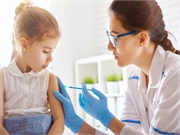Vaccinations Rose After California Curbed Exemptions
By Amy NortonHealthDay Reporter

MONDAY, Dec. 23, 2019 (HealthDay News) -- If new research is any indication, tougher vaccine exemption laws work.
After California eliminated nonmedical exemptions from vaccinations in 2016, the number of children receiving recommended immunizations rose -- especially in counties where "vaccine hesitancy" runs high, a new analysis found.
The policy -- passed in response to outbreaks of measles and other "old" childhood diseases -- barred parents from getting vaccine exemptions for philosophical reasons. After it went into effect, overall vaccine coverage in California increased by about 4%.
"That might sound modest," said senior researcher Dr. Nathan Lo. "But in high-risk counties, there really was an impact."
Those counties are the ones where vaccination rates had been low enough to set the stage for disease outbreaks.
Across those hot-spots, vaccine rates improved by 10% to 20%, according to Lo, a medical resident at the University of California, San Francisco.
Dr. Paul Offit is director of the Vaccine Education Center at Children's Hospital of Philadelphia. He said, "This is an important study. It proves that vaccination rates go up when you eliminate nonmedical exemptions."
That had not been a foregone conclusion when California changed its policy, noted Offit, who was not involved in the new study. He said that some concerns had been raised that determined parents would seek "bogus" medical exemptions, and get them from certain doctors.
The study did, in fact, find a small increase in medical exemptions after the 2016 law: Overall, they went up 2.4%. The pattern was concentrated in certain areas: In Plumas County, in the state's Sierra Nevada area, the rates of medical exemptions soared from 1% in 2015, to over 10% in 2017.
However, Lo said, the overall rise in medical exemptions was offset by the improvement in vaccination rates, particularly in high-risk counties.
And in almost all counties, the vaccination rate was brought up to 95%, which is considered sufficient to create "herd immunity." The term refers to the fact that when enough people are vaccinated against a given disease, it will also protect the few who are unvaccinated -- such as young infants or people with certain medical conditions.
The report from Lo's team was published online Dec. 23 in PLOS Medicine.
All U.S. states allow vaccine exemptions for children with certain medical conditions. Most also allow parents to object to vaccinations due to religious beliefs, while a minority permit exemptions due to "personal beliefs."
But with childhood diseases like measles, mumps and whooping cough making a comeback in recent years, a number of states have tightened their laws on nonmedical exemptions. Some, such as Vermont, have targeted only personal belief exemptions.
At this point, five states have banned all nonmedical exemptions, according to the National Conference of State Legislatures. Besides California, they include Maine, Mississippi, New York and West Virginia.
Do the latest findings suggest all states should follow suit?
Lo said the researchers' goal is to "provide information" to policymakers as they consider vaccination legislation.
To Offit, exemptions based on people's beliefs are "nonsensical on their face." No major religion actually says children should not be vaccinated, he noted, and parents with philosophical objections have often been "misinformed" about vaccine safety.
"Vaccines aren't a belief system," Offit said. "They are science-based."
Even so, more than 1,200 measles cases were reported this year, the most since 2000, according to the U.S. Centers for Disease Control and Prevention.
Overall, vaccination rates among U.S. children do remain high. Government figures show that among children born in 2015, only 1.3% had not received any vaccines by age 2 -- though that was up slightly, versus a few years prior.
Globally, Lo noted, vaccine-preventable diseases still strike many people -- over 3 million a year, according to the World Health Organization.
"In this country," Lo said, "we're lucky enough to have access to vaccinations."
More information
The U.S. Centers for Disease Control and Prevention has more on vaccine safety.

The news stories provided in Health News and our Health-E News Newsletter are a service of the nationally syndicated HealthDay® news and information company. Stories refer to national trends and breaking health news, and are not necessarily indicative of or always supported by our facility and providers. This information is provided for informational and educational purposes only, and is not intended to be a substitute for medical advice, diagnosis, or treatment.

